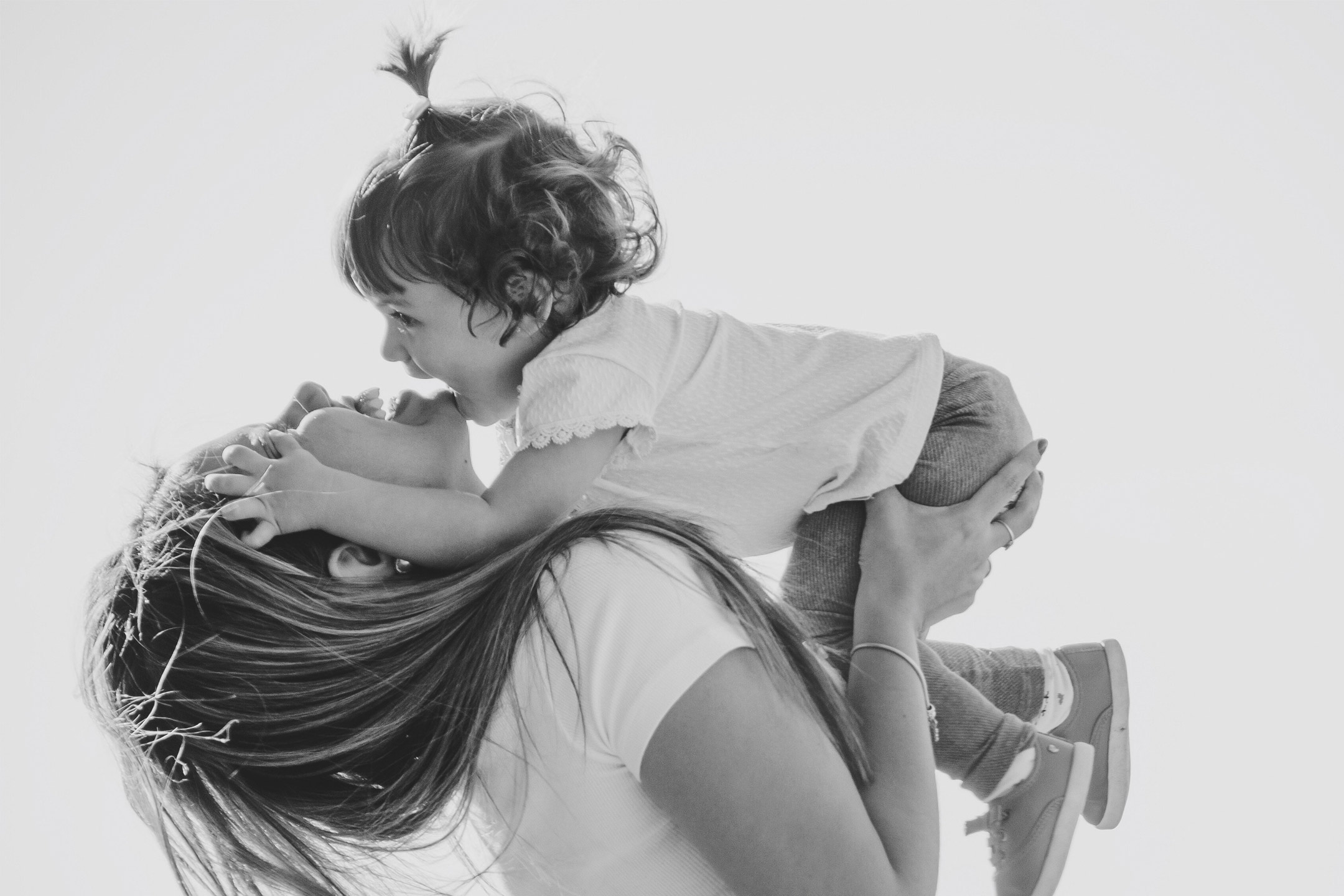
24 Sep How It Is…Parenthood
Wendy James considers the lifetime commitment that is parenthood.
When the receptionist asks for my daughter’s date of birth I am slow to respond. Is it the 23rd or the 24th? May or June? The woman laughs, shakes her head and clucks: “How could Mummy forget such an important day? Goodness me!”
I think of my own mother’s faulty memory: my birthday mistakenly celebrated three days late for years. My four-year-old daughter, who is really too big to be carried, clings to me, her face pressed close against my chest, arms around my neck, legs straddling my side. I have to prise my hand from under her thigh to sign where the woman indicates. “Ta,” she says. “Take a seat. You won’t be waiting long; there’s only one patient before you.”
The surgery is dark – the walls panelled in mahogany formica, the blinds drawn – and shabby. Files lean untidily in sagging shelves. A middle-aged couple sits together at one end of the room. The woman is knitting. Something navy, long. A sleeve, a scarf. She looks up briefly as we take the opposite seat and smiles. Her companion is reading a book – hardbacked, substantial. He frowns down at the page. I wonder which of them is waiting to see the doctor and why. My daughter is still clinging, her arms around my waist now, her eyes closed, perhaps she’ll drift off.
There’s a pile of magazines on a side table: National Geographic, the odd Bulletin, women’s magazines. I choose one that looks fairly recent. There’s a dark-haired Hollywood beauty on the cover and I skim through the related article: how she’s always wanted to act; how hard she’s had to fight to be taken seriously; how her IQ’s in the highest percentile; how she really doesn’t think she’s attractive; how she loves food and rarely exercises; how she’s looking forward to motherhood. She’d like to start a family by the time she’s 35, she says, same as her mum. That gives her three years to find the right man: just a regular guy for a regular girl.
I close the magazine, look hard at the cover photo. She’s two years older than me and could be five years younger.
“Dreadful when they’re like that isn’t it?” The receptionist is looking at my daughter, who still hasn’t moved.
“Yes,” I say. “Yes. Awful.”
“I had my two down with gastro last month. A nightmare, it was. I had to take a week off work. You can’t leave them with anyone else when they’re like that can you? I mean, they’re so demanding. I had the baby in my bed and my son on the lounge, and I’d no sooner have one of them settled, and the other’d start up. ‘Mummy come here, mummy do this, mummy I want you. Mummy.’ I was glad to get back to work, I can tell you. Though, it’s funny – when I’m here I’m thinking of them all the time, missing them, you know. All the bits of their childhood I won’t get to see.”
My daughter’s been in daycare since she was six months, I tell her, four days a week. She starts school next year. It doesn’t seem possible.
“Oh, I know. My son’s seven already. I keep telling him I want him to stop right there. To stop growing up. Sometimes I can’t help it – I grab him and cuddle him, smother him with kisses. I have to, I tell him. You won’t let me for much longer. You’ll be embarrassed.
‘Oh Mum,’ he says. ‘Mum, I’ll never be embarrassed. Just don’t ever kiss me in front of my friends.’ Typical.
“There’s more to us being here,” your best friend says, “more to being women, more to being alive, than motherhood. You can’t say that my experience of life will be any less whole, any less satisfying than yours, just because I’ve chosen not to have children. And what about women who want them and can’t have them? What do you say to them?”
You don’t want to say anything to them. To anyone else. You want her to know that what you’ve said is personal, not universal. You say nothing.
“Listen,” she says, “I know about motherhood. I can see what it’s done to my mother, what it’s done to generations of women.”
You know the words she’d like to use but doesn’t: oppression, repression, exploitation, submission, negation.
“Don’t you think that there are some women, some people, who just shouldn’t have children? I really love your kids. I like being an aunt. I’m not criticising your life. I can see that it makes you happy, that you’re doing what you want to do.”
You know that she really wants to tell you that you’ve wasted yourself. That you’ve given too much of yourself away. That you’ve blown it.
“And don’t think I’m repressing some subconscious desire. There’s nothing biological – no clock ticking away. That’s bullshit. We’re not animals.”
You want to tell her about the simplicity and purity of biological things, animal things, but, even drunk, you don’t like to be boring. “I don’t want any of it. It terrifies me. Because you can’t get out. Just say one day you want to – you can’t get out, can you? Not ever.”
I have to agree. “‘Yes,” I say, “I guess we are.”
As if to punctuate the point, my daughter stiffens and cries out. I rub her back, rock back and forth, murmur soothing nothings against her hair until the cramp subsides. The doctor – a woman, tall, fortyish – enters the room through a side door, talks quietly to the receptionist for a moment, then calls the next patient. “Mr Garfield,” she says, smiling encouragingly. The man sitting opposite closes his book, passes it to his wife, stands with some difficulty. He walks with a limp, has a built-up shoe. The woman watches, her hands still, until he’s ushered through the doorway. “I’ll never get used to it,” she says, “to him being Mr Garfield. He’s still my little boy. My little Geoffrey.” She puts his book in her basket and goes back to her knitting.
I reach for the magazine again, open it awkwardly above my daughter’s head. I glance through an article about dieting. It tells me how to work out my body mass index, but I can’t remember my height in centimetres, would rather not recall my weight in kilos and can’t multiply double digits in my head, so I turn the page.
“Children of the Dead,” I read. “Why the Dead give birth.” The report tells of pregnant women who are comatose, on life support – women who are clinically dead who give birth to healthy infants. The natural progress of these pregnancies is often welcomed by grieving spouses and parents, as a way to retain something of their loved one. But there is one man, whose comatose wife recently gave birth, who doesn’t seem so sure. “‘I love my son,” he says, “and we both wanted children, but not this way.
I begged them to terminate, but they wouldn’t. She was only eight weeks pregnant. I asked one doctor why, and he said it was a physician’s sacred duty to maintain life. It was degrading; she became something less than human. She just lay there, her hair matted, her body bloated, her face unrecognisable. So swollen they had to tape her eyes into their sockets to stop them from bursting out.”
The limping man emerges. His mother stands. The doctor calls my daughter’s name without looking up from the card, then stalks back through the doorway. I follow her, shifting the child’s weight gently from my middle to my side. Close up the doctor is older than I’d thought, her hair thin, grey, her clothes heavy and old-fashioned. She sits, motions me to a nearby chair. “So. What seems to be the problem with this little poppet?”
“Gastro, diarrhoea,” I tell her. Four days now. Terrible cramps. Doesn’t seem to be getting better.
“Is she getting plenty of fluids?”
“Yes, plenty,” I assure her. I’ve been very conscientious. Gastrolyte, water, diluted apple juice. “But it’s going on so long. Isn’t there something I can give her?”
“This sort of thing is generally not serious. Best just to let it run its course. Let her build up antibodies.”
“Well, something for the cramps… She’s not sleeping.”
“It’s best not to give littlies anything. Pain-killers will just irritate the gut and make things worse. Just keep up the fluids and keep doing what you’re doing now. Give her plenty of cuddles. Lots of attention. A hot-water bottle might give her some relief from the cramping, but I think you’ll find that over the next few days what she’ll need more than anything else is her mother. Inconvenient for you, but that’s how it is, isn’t it? That’s kids.”
I want to tell the doctor that if my daughter’s not sleeping, I’m not sleeping. That if she’s up all night and all day, then I’m up with her, washing her, wiping her, all night and all day. That if she’s whingey and clingy, then I’m whingey and clingy. That if her bum’s raw and chafing, that’s me – raw and chafing. That if she has a pain in the gut – a pain anywhere – then I feel it too.
I want to tell the doctor that I haven’t been out of the house for a week, that I have other children, a husband, friends, work. I want to tell her that sometimes it seems as if my daughter’s already had all of my attention. All of my time. All of me. I want to tell her that it’s not just inconvenient, that it’s not just a few more days, but a lifetime. My lifetime. My Life.
I want to tell her all this, but I can’t. Instead I have to agree. “Yes,” I say. “Yes.”
That’s how it is.




